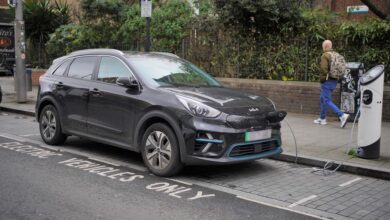Cars en route to Israel to get tax discount. Hybrid opposition


After a struggle by Knesset members and car importers, the Tax Authority agreed last night to comply with a request to prevent thousands of electric cars from becoming more expensive next week.
Four ships carrying cars, currently sailing to Israel from China and South Korea, have been sent on a long route planned around Africa, to avoid the hybrids’ attacks in the Red Sea, which target ships sailing to Israel or owned by Israelis.
The ships are carrying around 5,500 electric cars and 1,000 plug-in cars, which will incur increased purchase taxes from 20% to 35% in the case of electric cars and from 55% to 83% in the case of plug-in cars starting January 1st. Originally, they were supposed to dock in Israel before December 31 and be subject to the lower tax rate, but due to the delay, they will arrive in the country only after the tax increase, which will effectively increase their cost by NIS 10,000-15,000.
Tonight, the Treasury published an order stating that those shipments will be exempt from the general tax increase as long as importers can prove that the ships sailed to Israel in time to arrive by the end of the month if they had sailed on the original and shorter route through the Red Sea and then to Eilat or Ashdod and Haifa.
“Due to the Swords of Iron war and the threat to the shipping routes in the Red Sea region, there were cases where shipping routes were altered to avoid security risks along the way”, explained Treasury legal advisor Asi Mesing, who signed the order. “As a result, a situation was created where ships were required to circumnavigate the continent of Africa (near the Horn of Africa) and reach the ports of Israel through the Mediterranean Sea”.
“This route change extended the travel time, and there are cases where ships that were supposed to arrive before the end of 2023 may arrive after that date. In order to allow for such cases, which include the import of Plug-in Hybrid Electric Vehicles and electric vehicles, a purchase tax rate that was supposed to take effect in 2023 (the date when the ships were expected to arrive without the mentioned security risk), and not the rate set for 2024, it is proposed to establish that the purchase tax rates set for Plug-in Hybrid Electric Vehicles and electric vehicles will continue to apply until January 31, 2024, on the condition that the Tax Authority is convinced that when the vehicle left the port of origin, it was supposed to arrive at an Israeli port by December 31, 2023, and the delay in its arrival was due to the security risk involved in the transfer of goods in the Red Sea during the Swords of Iron war”.
However, the struggle to postpone the tax hike for two years, which had the support of the chairman of the Finance Committee, directors-general of the Transportation, Energy, and Environmental Protection Ministries, was unsuccessful, and Finance Minister Bezalel Smotrich chose to implement the tax hike as planned, a move that will bring in billions of shekels to the country in the coming year.
Smotrich refused to reinstate the tax on sweetened beverages and disposable utensils, which had health justifications behind them and were meant to bring a similar amount into the country, but decided to increase the tax on cars whose usage cost less in the midst of a cost of living crisis. The relief for the four ships arriving late will bring into the country around NIS 130M in tax revenue.



